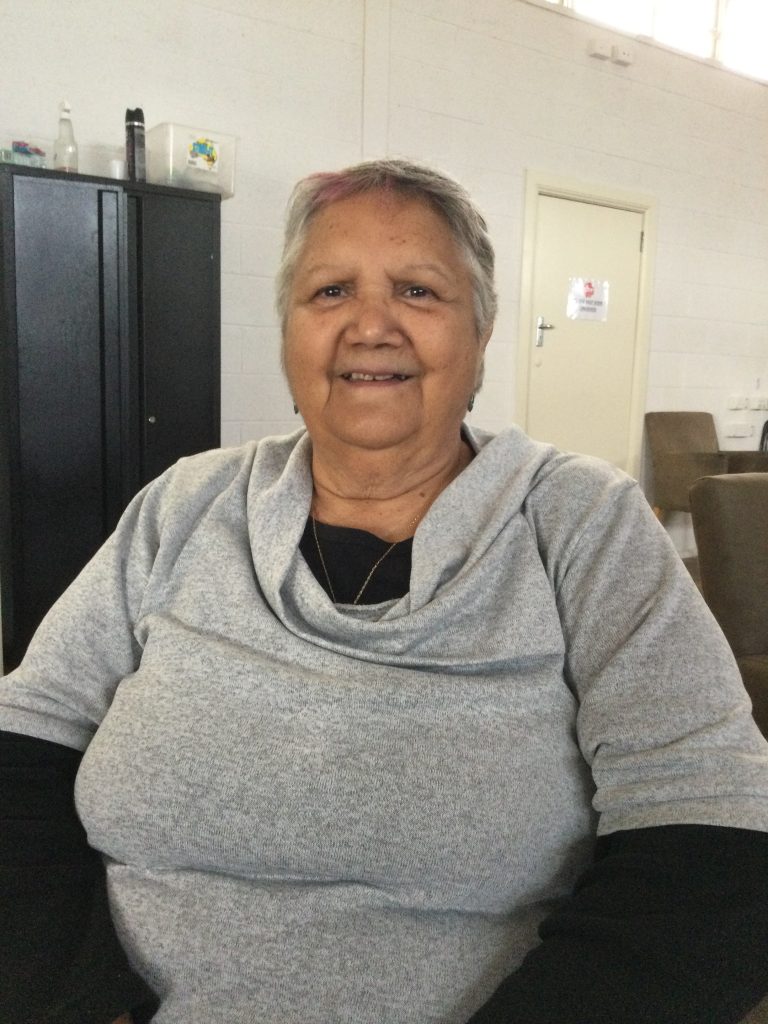Archived News Item
Salt ‘n’ Pepper: Healing Through Hope
April 3, 2024
Aunty Pat Waria-Read
Mercy Works proudly supports a project called Salt ‘n’ Pepper an innovative outreach program supporting indigenous women in prison and post release, a time for that for many is the darkest of their lives.
For two decades, Jane’s* life has been marked by heartache and struggle, trapped in a relentless cycle of incarceration that began in her early twenties. It all unravelled when child protection services deemed her an unfit mother, taking her three children. Jane is a single Aboriginal mother grappling with life’s challenges and now the despair of losing her purpose. She embodies the pain of a mother who has lost everything dear.
Jane’s mission is to secure a home, regain custody and provide her children the love they deserve. However, her path is an uphill battle. After becoming entangled with a man who introduced her to the shadowy world of substance abuse she found herself back in prison. Bravely, she is now clean of drugs and his influence.
Her young children remain in foster care under the Department of Child Protection’s jurisdiction. They face further turmoil as the system looks to relocate them due to their grandmother’s inability to care for them. The Department will not tell Jane where they will be placed.
The stress Jane bears is unimaginable, especially while locked behind bars. Uncertainty about her kids’ future, along with her own impending court date, hangs like a dark cloud.
The hope is to secure Jane a place outside of prison, one that the courts deem suitable for release. The goal is to find her stable accommodation where she can begin to rebuild her life and more importantly, her children’s lives. It won’t be through any familiar connections as she’s been isolated for too long.
Jane’s story isn’t a unique one; it’s a painful reflection of many female inmates. In this specific facility, Adelaide Women’s Prison, the women of Aboriginal descent believe they make up an alarming 85% of the population, a stark contrast to 33%, the official government number. The Department of Correctional Services may claim otherwise, but the women themselves know the truth. Their stories are a chorus of despair, a plea for understanding, and an urgent call for change.
Enter Aunty Pat Waria-Read, a guiding light for many indigenous women caught in a continuous pattern of detention. As a co-founder of the Salt ‘n’ Pepper initiative, an outreach program supporting these women in prison, she stands as a beacon of optimism, offering unwavering support and care to those in need.
“One of the biggest problems in Adelaide right now is that there is no available accommodation for [women like Jane],” Aunty Pat laments, her voice heavy with concern. “There are people sleeping in cars, in doorways, in any place that can offer some shelter. There are no halfway houses. So, when they get out of jail, there is nowhere for them to go.”
Home Detention, often a condition of release, comes with its own set of challenges. Home Detention allows offenders and prisoners to live in the community under strict supervision at a nominated location while monitored by an electronic device. It makes it far more difficult to find housing solutions for these women as most accommodation refuse to accept people with Home Detention orders.
As the women are restricted to a certain space any outing requires notification and scrutiny by correctional service officers. Aunty Pat knows the system’s pitfalls and the dire consequences it can bring. “If there is any discrepancy the Department of Correctional Service will send people, usually the police, to investigate and report, often resulting in the issuing of a warrant for a return to jail.”
Salt ‘n’ Pepper is their lifeline, filling the gaps left by the official channels. “We visit them, we encourage them and we follow up on those things that aboriginal services in the prison can’t do,” she explains. Their role extends to searching for accommodation, connecting with family members willing to offer a place for Home Detention and assisting in securing essentials for their eventual resettlement.
What sets Salt ‘n’ Pepper apart is its availability for women who often find themselves alone and struggling through the darkest hours of their lives. “They need someone 24/7 who cares for them,” Aunty Pat emphasises. “Some days I could be home, and somebody rings and says, ‘Aunty Pat, I am in this trouble. Could you come and get me?’ And that’s what I do.”
Cultural connection is another cornerstone of the work Salt ‘n’ Pepper undertakes. Indigenous women face unique challenges often struggling with addiction and broken family ties. “The families find it very hard to be encouraging and supporting,” Aunty Pat explains. “It’s not like the families are not there for them. It’s just that the families are tired. So, we encourage our women.”
Aunty Pat’s passion and dedication shine through her words: “Even if they’ve been in and out of jail for about 20 or 25 years, it doesn’t matter to me. We will always be there to help them as long as we can.”
This program’s impact is immeasurable and Mercy Works’ contribution has been instrumental in sustaining its operations. Salt ‘n’ Pepper has touched the lives of hundreds, if not thousands of indigenous women in need.
Aunty Pat’s vision is clear: “Seeing people grow and allowing them the freedom to do that.” She believes in empowering those she helps not just providing temporary assistance but giving them the strength and support they need to stand on their own feet.
Margie, Aunty Pat’s co-founder, has been an invaluable ally. Their partnership, fondly represented by the program’s name Salt ‘n’ Pepper, is a testament to unity transcending cultural boundaries. Margie’s unwavering support has made a significant difference.
Yet, Aunty Pat remains acutely aware of the ongoing battle against racism insisting “If we are going to heal this country, the first thing we need to get rid of is that racism.” Her tireless efforts alongside the Salt ‘n’ Pepper program, symbolise a crucial step toward healing and hope, bridging the divide to build a brighter future for indigenous women.

* Not her real name.
To find out more about Mercy Works – https://www.mercyworks.org.au/
Article and photos kindly provided by Mercy Works.
